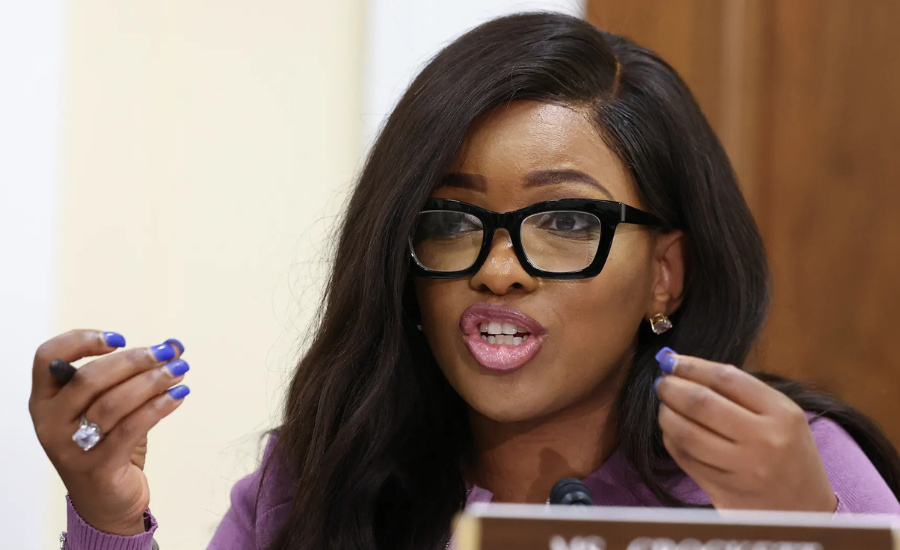NOTE: VIDEO AT THE END OF THE ARTICLE.
Representative Jasmine Crockett (D-TX) faced a wave of criticism this week following her defense of U.S.-funded programming in the Middle East during a House Judiciary Committee hearing. The comments came in response to Republican scrutiny over the spending practices of the now-defunct United States Agency for International Development (USAID), with particular focus on a children’s television initiative known as Ahlan Simsim, the Arabic-language adaptation of Sesame Street.
The hearing, held Tuesday, centered on an ongoing review of USAID’s foreign aid expenditures before it was dismantled earlier this year by the Department of Government Efficiency (DOGE). Republicans on the committee questioned the justification for funding international media projects and health initiatives with American taxpayer dollars, especially in countries where U.S. influence is already contentious.
At the center of the controversy was Ahlan Simsim, a joint project between USAID and Sesame Workshop that aimed to foster values such as mutual respect, inclusion, and cross-cultural understanding among children in conflict-affected areas, including Iraq, Jordan, and Lebanon. The show was designed to be a culturally relevant counterpart to the American Sesame Street, with the broader goal of promoting positive perceptions of the West.
During the hearing, Rep. Crockett defended the initiative as part of a broader strategy to reduce anti-American sentiment abroad. She argued that media programs like Ahlan Simsim serve as a soft power tool to counter disinformation and prevent the radicalization of foreign populations.
“When we start to talk about whether or not Sesame Street or anything else that’s on NPR or PBS ends up in other places,” Crockett said, “this is so there is not this warped thought process about the western world or the United States.” She continued, “We’re talking about making sure that we don’t end up allowing people to be radicalized against us because they have a terrible vision of us… maybe in a government that actually puts out bad, terrible propaganda about us.”
Her comments drew immediate backlash from Republican lawmakers and conservative commentators, many of whom questioned the effectiveness and necessity of funding children’s programming in foreign countries using U.S. taxpayer dollars. Critics also noted that Crockett did not provide direct evidence that such programming measurably reduces radicalization or enhances national security.
The hearing also addressed USAID’s broader spending record, which has come under fire in recent months. Among the agency’s reported expenditures in 2022 and 2023 were $68 billion in foreign aid, including large allocations to Ukraine, as well as funding for health services and gender-transition procedures in Latin America. In Guatemala, for instance, USAID spent $2 million to support local organizations providing gender-transition treatments, a decision that prompted concern from lawmakers and watchdog groups alike.
Further criticism stemmed from USAID’s role in distributing tens of millions of contraceptive products across various developing nations. According to DOGE’s review, in fiscal year 2022, the agency was responsible for distributing more than 65 million condoms, nearly 10 million doses of injectable contraceptives, and over 300,000 IUDs internationally.
Despite the agency’s dissolution in February, Rep. Crockett has remained a vocal proponent of foreign aid programs. In a recent appearance on the Let’s Be Clear podcast, she claimed that cutting off such aid could have severe consequences for U.S. national security. “If we are not careful, what we’re doing is paving the way for another 9/11,” she warned, though she did not present evidence directly linking the loss of USAID programming to a renewed threat of terrorism.
The exchange reflects ongoing partisan divides over the role of the U.S. government in funding international aid, especially through cultural and social initiatives. As the 2026 election cycle nears, issues surrounding government spending, foreign policy, and soft power will likely remain at the forefront of congressional debate.
PLAY:

Sarah Mitchell is a bestselling novelist recognized for her insightful and emotionally resonant stories that explore the complexities of human relationships. Originally from Denver, Colorado, Sarah grew up in a family of teachers who nurtured her curiosity and love for storytelling. She studied psychology at Stanford University, where she became fascinated by the intricacies of human behavior—an interest that would later shape her writing career. Sarah’s novels are praised for their nuanced characters, intricate plots, and ability to capture the subtle tensions that define love, friendship, and family ties. Her breakthrough novel, The Spaces Between Us, became an instant bestseller, lauded for its honest portrayal of strained family relationships and the fragile bonds that hold people together. Since then, she has published several works that continue to captivate audiences around the world. Outside of her writing career, Sarah is passionate about mental health advocacy and often partners with organizations to promote awareness and support for those struggling with emotional well-being. Her personal life is quieter—she enjoys hiking in the Colorado mountains, practicing yoga, and spending time with close friends. With each new book, Sarah Mitchell cements her reputation as a writer who illuminates the beauty and struggles of human connection.









